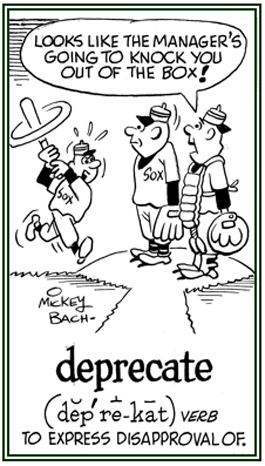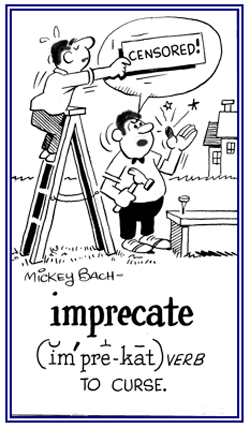pray-, preca-
(Latin: to ask, to entreat; ask earnestly, entreaty, beg; request, petition, pray, prayer)
deprecate (DEP ri kayt") (verb), deprecates; deprecated; deprecating
1. To protest, to express strong disapproval of, or to make a condemnation of something or somebody: The city spokesman deprecates the use of violence as done by some demonstrators.

© ALL rights are reserved.
Go to this Word A Day Revisited Index
The townspeople deprecated the new exhibit at the art museum because it was so negative about religions.
2. To belittle, to deplore: Everett, you should not deprecate your own worth to the community because you have done so much to help homeless people.There are many who deprecate the use of public money for what they consider to be nonessential purposes.
3. Etymology: from Latin de-, "away" + precari "to pray, to request" from which we also get pray and prayer. Originally, it meant "to pray for deliverance from something unfavorable".
Go to this Word A Day Revisited Index
so you can see more of Mickey Bach's cartoons.
1. Disapproval of or the minimization of something or someone: There was considerable deprecation regarding the use of company funds for political purposes.
Elaine said she didn't mean to deprecate Dudley's accomplishments as an author, but there weren't very many who purchased his book.
2. A prayer meant to avert or to remove some evil or disaster: Adam had deprecations in his nightly prayers to God to help people who were caught in the tornado.
deprecative (adjective), more deprecative, most deprecative
1. Given to expressing disapproval or tending to diminish or to disparage a person or some action.
2. A reference to the removal or the averting of some evil by means of prayer.
2. A reference to the removal or the averting of some evil by means of prayer.
deprecatory (noun), more deprecatory, most deprecatory
1. Characterized by a tendency to diminish or to disparage: Deprecatory remarks were made by her husband about the book that she purchased.
2. A reference to expressing disapproval or criticism.
3. Mildly uncomplimentary; especially, of oneself.
2. A reference to expressing disapproval or criticism.
3. Mildly uncomplimentary; especially, of oneself.
imprecate (IM pri kayt") (verb), imprecates; imprecated; imprecating
1. To utter obscenities or profanities: After hitting his thumb with the hammer, Charles started to imprecate at the top of his voice.
2. To wish harm upon; to invoke evil upon: The three witches in the Scottish play were on the moors imprecating against the Scottish lord.
3. To call down harm; especially, a curse on someone: After experiencing one disaster after another, the farmer was so upset that he imprecated against the weatherman because of the misleading forecasts.
4. Etymology: Latin imprecari, imprecat-; in-, "towards" + precari, "to pray, to ask".

© ALL rights are reserved.
Go to this Word A Day Revisited Index
2. To wish harm upon; to invoke evil upon: The three witches in the Scottish play were on the moors imprecating against the Scottish lord.
3. To call down harm; especially, a curse on someone: After experiencing one disaster after another, the farmer was so upset that he imprecated against the weatherman because of the misleading forecasts.
4. Etymology: Latin imprecari, imprecat-; in-, "towards" + precari, "to pray, to ask".

Go to this Word A Day Revisited Index
so you can see more of Mickey Bach's cartoons.
1. The calling down of harm on someone: The storm was so sudden and severe that the ancients thought it was an imprecation from the gods.
2. An offensive word or phrase that people say when they are angry: Sharon muttered an imprecation under her breath when she was accidentally bumped into by another woman in a store.
3. Swearing or blasphemy; a slanderous accusation: The society editor in the local paper often wrote imprecations about prominent people in the community and it was amazing that she had never been accused of defamation of character.

© ALL rights are reserved.

© ALL rights are reserved.
Go to this Word A Day Revisited Index
2. An offensive word or phrase that people say when they are angry: Sharon muttered an imprecation under her breath when she was accidentally bumped into by another woman in a store.
3. Swearing or blasphemy; a slanderous accusation: The society editor in the local paper often wrote imprecations about prominent people in the community and it was amazing that she had never been accused of defamation of character.


Go to this Word A Day Revisited Index
so you can see more of Mickey Bach's cartoons.
Someone who says an offensive word or phrase; especially, when angry.
pray (verb), prays; prayed; praying
1. To make an entreaty; that is, to beg, beseech, implore; to beg.
2. To ask someone earnestly and fervently; to entreat (to beg someone for something, often repeatedly).
3. To utter or to address a prayer or prayers to God, a god, or another object of worship.
4. Etymology: from Latin precari which meant "to ask for, to entreat, to pray".
2. To ask someone earnestly and fervently; to entreat (to beg someone for something, often repeatedly).
3. To utter or to address a prayer or prayers to God, a god, or another object of worship.
4. Etymology: from Latin precari which meant "to ask for, to entreat, to pray".
In Vulgar Latin, it became precare, which passed into English via Old French preier.
The noun prayer goes back ultimately to the Latin adjective precarius, "obtained by asking or praying".
1. The act of offering reverent petitions; especially, to God or a deity.
2. The act of beseeching earnestly; an entreaty.
3. Communion with God and recognition of His presence, as in praise, thanksgiving, intercession, etc.
4. The act of communicating with a deity; especially, as a petition or in adoration, contrition, or thanksgiving.
5. A religious observance in which praying predominates: William and his family had their morning prayers today.
2. The act of beseeching earnestly; an entreaty.
3. Communion with God and recognition of His presence, as in praise, thanksgiving, intercession, etc.
4. The act of communicating with a deity; especially, as a petition or in adoration, contrition, or thanksgiving.
5. A religious observance in which praying predominates: William and his family had their morning prayers today.
prayer beads (noun) (a plural used as a singular)
A string of beads for keeping count of the prayers one is saying; a rosary.
1. A book containing religious prayers.
2. A Prayer Book: The Book of Common Prayer: The Anglican service book of the Church of England; which has had several revisions since the Reformation and is widely admired for the dignity and beauty of its language.
2. A Prayer Book: The Book of Common Prayer: The Anglican service book of the Church of England; which has had several revisions since the Reformation and is widely admired for the dignity and beauty of its language.
An evangelical service; especially, one held on a weekday evening, in which the members of a church participate by singing, praying, or testifying their faith.
A small rug used by Moslems to kneel and to prostrate themselves upon during devotional services.
A cylinder containing, or inscribed with prayers or litanies, that is revolved on its axis for devotions; especially, by Tibetan Buddhists.
prayerful (adjective), more prayerful, most prayerful
1. A reference to making petitions or solicitations to a holy being.
2. Relating to humbly begging someone for help or their time.
2. Relating to humbly begging someone for help or their time.
Showing page 1 out of 2 pages of 19 main-word entries or main-word-entry groups.

